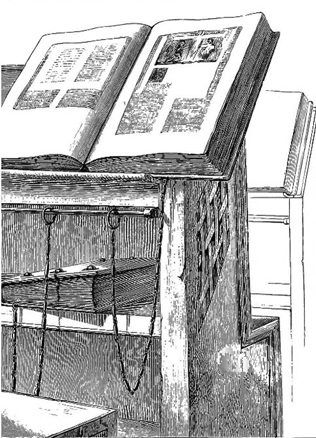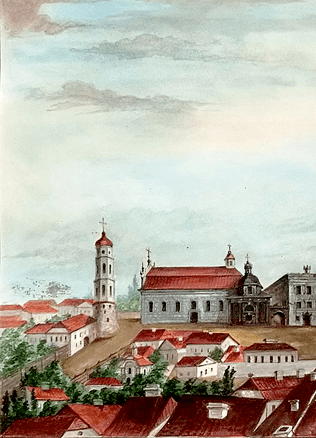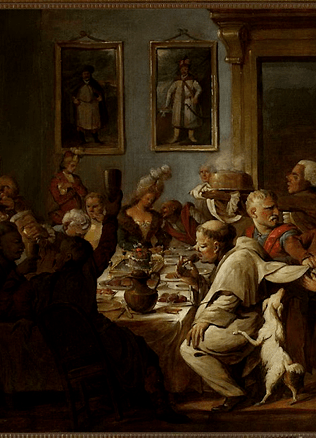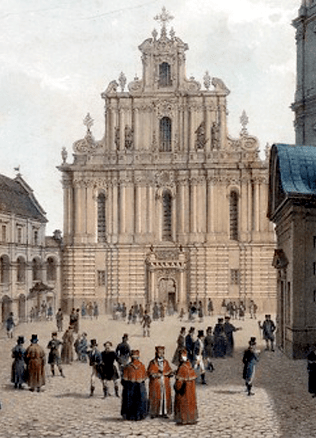Books and Libraries in the 17th Century
Analysing books and libraries possessed by city dwellers help reveal their cultural level and the nature of their education as well as their intellectual interests and standpoints. There were no public libraries in the cities of the Grand Duchy of Lithuania throughout its entire history while only the selected few could access the libraries that the institutions of education and religion had. Therefore, the post-mortem property inventories and the data provided in testaments serve as the prime source of information about books and libraries that the city residents owned. Sometimes historians also make use of occasional messages about books or book collections possessed by particular individuals.
What did Vilnans read?
Historical sources are too meagre to allow the analysis of book collections owned by the residents of Vilnius prior to the 17th century.
The 1649 post-mortem property inventory of Stefan Lebedzewicz, the burgomaster of Vilnius, is among the earliest documents speaking of private libraries of that time.
His collection of 112 books was then one of the largest known private libraries in Vilnius and included 96 books in Latin, just four in Polish and another 12 in Ruthenian and Old Church Slavic. His library is a reflection of certain Ruthenian-type humanism. The Latin-language collection included books by Philipp Melanchthon, the History of Poland by Jan Herburt, the Bible and the Chronicle by Martin Cromer. Religious books, such as the Bible, the works by St. Basilius, Francysk Skaryna, as well as the St. Ostrog’s Catechism, dominated the Slavic part of the collection. The library was unique and exceptional in terms of size and content; it also speaks of the owners passion to collect books. Among other books, Lebedzewicz had the 1525 Apostle by Skaryna, the Ostrog Bible and the hand-written copy of the Acts from the New Testament.
Other written sources provide some information on libraries and books collected by the representatives of the Vilnius ruling elite in the second half of the 17th century. Just over 20 of the wealthy residents of Vilnius had their private libraries at that time. As a rule, all of them were well educated and engaged in professional activity. Books, especially the ones related to law, were the items of prime necessity for most of them. It is safe to assume that more than a half of the ruling elite had book collections of different sizes at their homes. Some other well-off residents of Vilnius might be added to the list as well making the overall number even bigger.
Sometimes historians study wills and occasional written messages in order to learn about books in private homes in Vilnius. Usually these documents merely mention books or a private library without providing detailed lists or even giving titles of particular books owned by a person. An incunable that belonged to Szymon Balądz, the burgomaster of Vilnius who died after 1636, is one of the surviving examples of books from personal collections. We also know that another burgomaster of Vilnius, I. Jackiewicz, had in 1647 in his library a manuscript of the Useful Tales about Latins (Rus.: Сказания полезные о латынах) from the late 16th century that eventually became a property of the Basilian Monastery in Zhyrovichy. Two Latin-language treatises by Galen of Pergamon belonged to surgeon Jerzy Gross. The library of the Vilnius Advocatus J. Piotrowicz, worth as much as 3,000 złotys, was inherited by his brother S. K. Piotrowicz, who worked as a court scribe. A representative of the Advocatus, M. Kliczewski, left all the books to his wife in his will dated 1667 while S. L. Romanowicz, a physician, named his son Kaspar the inheritor of his book collection. Yet another burgomaster of Vilnius, M. K. Gudelewicz, ordered to give his entire library “from small to smallest book” as a gift to the Carmelite priests. The burgomaster M. Stefanowicz-Wargalowski lost his copies of The Metamorphoses by Ovid and the Annales ecclesiastici by Caesar Baronius during a skirmish in 1687. A resident of Vilnius J. Sebestyanowicz bought in 1661 a book by Justus Lipsius from an assessor M. Žypla. The Bible owned by another assessor, J. P. Klarowski, was inherited by his counterpart J. Pawlowicz after the death of the former. The portrait of wojt P. Boim depicts the man with several books.
Among the most popular – legal and religious literature
Judging by the surviving inventories outlining the 17th-century private libraries in Vilnius, the book collections here were considerably smaller compared to these in Krakow where the city elite boasted from 200 to 450 books in their homes. The strong and wealthy in Vilnius had just 7–8 to 82–88 volumes the majority being books on law issues (32 percent of all books) as well as theology and religion (about 20 percent). Fiction, political literature, philosophy and rhetoric were in the minority constituting only six to ten percent of an entire library. In terms of language, books in Latin prevailed distantly followed by volumes in Polish, German, Ruthenian and Italian. Only several books in Czech and Hungarian are known to have been part of private collections.
Most of the books were printed in Western Europe, some of them in Poland. Books originating in Vilnius are very rare. The members of the elite usually opted for contemporary authors although antique Roman and Greek as well as mediaeval writers were also popular. Eight złoty was the average price for a book but individual volumes could fetch up to 30 złoty. Atlases, encyclopaedia-type reference books, dictionaries and basic sources of legislation were among the most valuable publications. Religious books and popular literature were cheaper. Several historical entries indicate that the elite occasionally also owned hand-written books.
The collectors usually were well aware of the value of their libraries, therefore they would become an object of inheritance, donation or pledge.
Since the property inventories are practical documents in the first place, books would usually be listed after all other valuables but before the documents in possession. The books featuring silver bindings, however, would find their place among lists of silverware. Nothing is known about the bookplates that were used by larger libraries of the time.
The private libraries in Kaunas were very similar to these in Vilnius. Historical sources mentioning books in Kaunas come from the 16th, 17th and 18th centuries. The official book of the wojt of Kaunas in 1542–1543 features a record about the Kaunas-based German merchant Kasparz Lentwar who had several unspecified books in his ship alongside other items. The municipal scribe named Tomas asked in 1545 to hand over his books to his pupils after his death. The sources give a little more information on the collection of Renaissance books that belonged to Jan Olander who lived in Kaunas. His library included a Chronicle in German, Adagia by Erasmus of Rotterdam, a collection of antique readings called Cornucopiae, 35 small-size handwritten and printed books, several unbound polemic books by protestant authors and several volumes by Wilhelm Gnapheus, a Dutch-born author and playwright.
Szymon Barankiewicz had a Catechism in Polish in 1561, while Wojtek Zaleski, a violinist, is the first known person in Kaunas to possess four music scores.
Lukasz Czernius, another resident of the city, had 22 books in 1642.
Book collectors represented different layers of the society, including the ruling elite, wealthy merchants, artisans and ordinary people, such as journeymen. Religious books prevailed, including the Bible, various Catechisms, and the 1785 Gospel by Jan Jaknowicz. In terms of popularity, they were followed by different literature on law and legislation, the books on the Magdeburg Law in the first place. Books were becoming a common thing both in Vilnius and Kaunas.
Literature: Z. Kiaupa, Kauniečių knygų rinkiniai XVI–XVIII a., Iš Lietuvos bibliotekų istorijos, Vilnius, 1984, p. 5–12; A. Ragauskas, Vilniaus miesto valdantysis elitas XVII a. antrojoje pusėje (1662–1702 m.), Vilnius, 2002, p. 256–264;
Aivas Ragauskas



